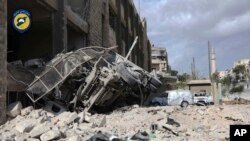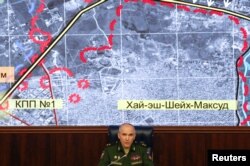U.S. military and intelligence officials are questioning whether Russia has the will or the capability to do anything about the growing crisis in Syria, accusing Moscow of perpetuating a humanitarian catastrophe.
The allegations came as the Syrian army announced a new campaign Thursday to retake rebel-held areas of Aleppo, crushing hopes of reestablishing a cease-fire and getting aid to civilians already ravaged by the five-year-long civil war.
“Russia can redeem itself by acting in good faith to implement a political process,” a U.S. intelligence official told VOA. “But there are few indications Russia has the wisdom to do that.”
The official, speaking on the condition of anonymity, emphasized the only acceptable outcome of any political process would be the removal of Syrian President Bashar al-Assad.
But there are also doubts as to whether Moscow could even deliver on such a plan, no matter what the eventual costs might be for Russia or the region.
“Assad lives under the delusion that he can one day rule a united Syria,” another intelligence officials said, also requesting anonymity.
“Unfortunately, no one will dispel him [Assad] of this notion,” the official added. “And in the meantime, thousands more people will die.”
Skepticism
Along with heightened skepticism about the intentions of Russia and the Assad government to seek a peaceful, political resolution there are also fears the Syrian regime’s latest assault on rebel-held Aleppo will not do much to change the balance of power on the ground.
Despite continuing their airstrikes on Aleppo as the cessation of hostilities fell apart, officials say there is not much to suggest Syria and Russia were able to sufficiently soften up opposition forces for a successful assault.
Nor does it appear that Syria’s ground forces were able to bolster their numbers or capabilities in a way that would give them any particular advantage.
Instead, officials say, the outcome will likely be another bloody stalemate.
U.S. officials warn the prospects of the regime being able to assert substantial control in other areas it has lost are also grim.
“The armed opposition to Assad numbers over 100,000 and will not disappear anytime soon," one of the U.S. intelligence officials said.
And, at least for now, more Russian military help for the regime does not appear to be in the offing.
Symbolic action
Russia’s announcement Wednesday it was sending its lone aircraft carrier to the Syrian coast has been dismissed as mostly symbolic. And U.S. officials say most of the Russian military hardware that has been sent into Syria seems to be more in line with protecting Russian bases or for the purpose of boosting Russian military sales.
While some in the intelligence community warn Syria will turn into an “albatross” ((a burden)) that could weigh down Russia for a generation, the highest-ranking U.S. military officer said Thursday Moscow is not there yet.
“It’s not clear to me that Russia is in a quagmire at this time in Syria,” Gen. Joseph Dunford, chairman of the U.S. Joint Chiefs of Staff, told the Senate Armed Service Committee under heavy questioning.
But while he said the U.S. has a “wide range of military options” that could potentially help change Russia’s calculation on Syria, other military officials indicate the U.S. seems resigned to keep trying negotiations.
“It’s important to continue to try, however difficult," a U.S. official told VOA. “They [the Russians] are in a situation where they are backing a regime that has no prospect of military success.”





